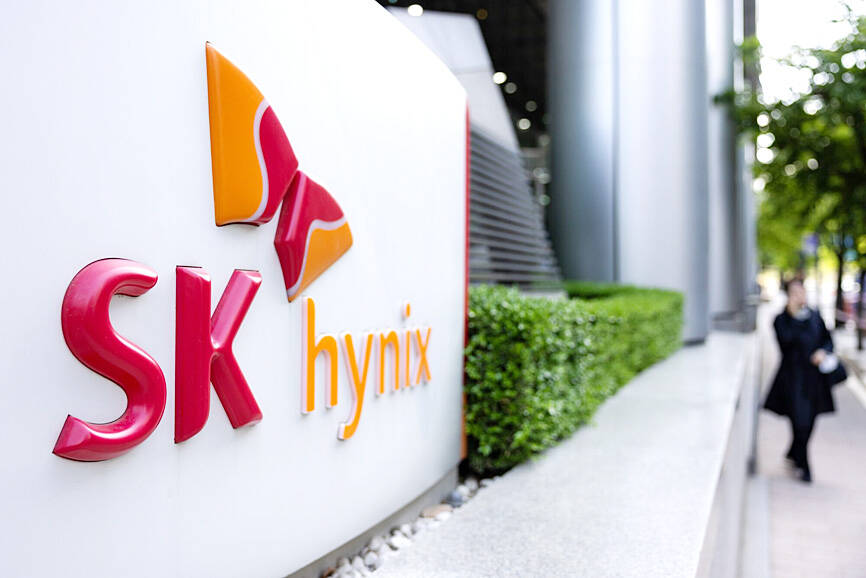SK Hynix Inc plans to spend about US$14.6 billion building a new memorychip complex in South Korea, preparing to meet rapidly growing demand for semiconductors employed in artificial intelligence (AI) development.
The company intends to set aside an initial 5.3 trillion won (US$3.9 billion) to begin constructing a new factory toward the end of this month, aiming for completion by November next year. The total investment on the site would surpass 20 trillion won as SK Hynix fits it out with equipment over the long term, it said in a statement.
SK Hynix, which is to report quarterly results today, is the leader in a type of advanced chip called high-bandwidth memory (HBM) tailored for AI, outcompeting Samsung Electronics Co.

Photo: Bloomberg
HBM chips work well with accelerators designed by Nvidia Corp, and SK Hynix foresees demand for HBM growing 60 percent annually in coming years, even as sales of regular DRAM climb alongside a proliferation of data centers.
The company plans to locate its newest plant close to its production base in Cheongju. It is also expanding in the US, with plans to spend US$3.9 billion on an advanced packaging plant and research center for AI products in Indiana.
SK Hynix is proceeding with other domestic investments including in the Yongin Semiconductor Cluster, where it is planning to inject about 120 trillion won in the long term.
Separately, Vietnamese tech giant FPT plans to build a US$200 million AI factory using Nvidia technology, the company said on Tuesday, as Vietnam aims to become a semiconductor and AI hub.
Long a low-cost destination to make clothes, shoes and furniture, Vietnam is now eyeing a rapid climb up the global supply chain and has put computer chips at the heart of its development plans.
“FPT is committed to digital transformation, AI, cloud, and education ... working to achieve its vision to turn Vietnam into an AI hub of the world through collaboration with Nvidia in technology, business development, and training,” FPT chairman Truong Gia Binh said in a statement.
The factory will help FPT "accelerate the construction and development of AI platforms and applications," he said.
As part of its collaboration with Nvidia, FPT plans to incorporate the US chip company's programs into university and high school curricula to develop high-tech human resources, aiming to reach at least 30,000 students within five years.
The statement did not give details of where the factory will be built.
Additional reporting by AFP

GROWING OWINGS: While Luxembourg and China swapped the top three spots, the US continued to be the largest exposure for Taiwan for the 41st consecutive quarter The US remained the largest debtor nation to Taiwan’s banking sector for the 41st consecutive quarter at the end of September, after local banks’ exposure to the US market rose more than 2 percent from three months earlier, the central bank said. Exposure to the US increased to US$198.896 billion, up US$4.026 billion, or 2.07 percent, from US$194.87 billion in the previous quarter, data released by the central bank showed on Friday. Of the increase, about US$1.4 billion came from banks’ investments in securitized products and interbank loans in the US, while another US$2.6 billion stemmed from trust assets, including mutual funds,

AI TALENT: No financial details were released about the deal, in which top Groq executives, including its CEO, would join Nvidia to help advance the technology Nvidia Corp has agreed to a licensing deal with artificial intelligence (AI) start-up Groq, furthering its investments in companies connected to the AI boom and gaining the right to add a new type of technology to its products. The world’s largest publicly traded company has paid for the right to use Groq’s technology and is to integrate its chip design into future products. Some of the start-up’s executives are leaving to join Nvidia to help with that effort, the companies said. Groq would continue as an independent company with a new chief executive, it said on Wednesday in a post on its Web

RESPONSE: The Japanese Ministry of Finance might have to intervene in the currency markets should the yen keep weakening toward the 160 level against the US dollar Japan’s chief currency official yesterday sent a warning on recent foreign exchange moves, after the yen weakened against the US dollar following Friday last week’s Bank of Japan (BOJ) decision. “We’re seeing one-directional, sudden moves especially after last week’s monetary policy meeting, so I’m deeply concerned,” Japanese Vice Finance Minister for International Affairs Atsushi Mimura told reporters. “We’d like to take appropriate responses against excessive moves.” The central bank on Friday raised its benchmark interest rate to the highest in 30 years, but Bank of Japan Governor Kazuo Ueda chose to keep his options open rather than bolster the yen,

Even as the US is embarked on a bitter rivalry with China over the deployment of artificial intelligence (AI), Chinese technology is quietly making inroads into the US market. Despite considerable geopolitical tensions, Chinese open-source AI models are winning over a growing number of programmers and companies in the US. These are different from the closed generative AI models that have become household names — ChatGPT-maker OpenAI or Google’s Gemini — whose inner workings are fiercely protected. In contrast, “open” models offered by many Chinese rivals, from Alibaba (阿里巴巴) to DeepSeek (深度求索), allow programmers to customize parts of the software to suit their